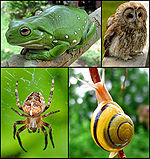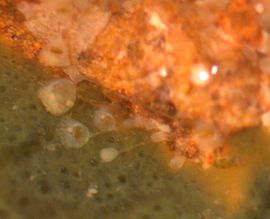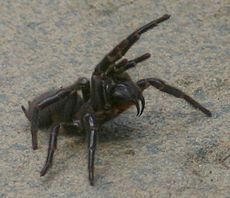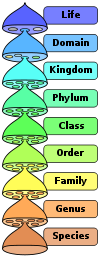- Portal:Animals
-
- Wikipedia portals:
- Culture
- Geography
- Health
- History
- Mathematics
- Natural sciences
- People
- Philosophy
- Religion
- Society
- Technology
The Animals Portal
Animals are a major group of multicellular organisms, of the kingdom Animalia, also known as Metazoa. Their body plan becomes fixed as they develop, usually early on in their development as embryos, although some undergo a process of metamorphosis later in their life. Most animals are motile, meaning they can move spontaneously and independently.The word "animal" comes from the Latin word animal, of which animalia is the plural, which in turn is derived from anima, meaning "vital breath" or "soul". In colloquial usage, the word "animal" usually refers to non-human animals. However, the word "animal", by biological definition, more correctly refers to all members of Regnum Animalia, including humans.
Selected article of the month
Entoprocta
Entoprocta, whose name means "anus inside", is a phylum of mostly sessile aquatic animals, ranging from 0.1 to 7 millimetres (0.0039 to 0.28 in) long. Mature individuals are goblet-shaped, on relatively long stalks. They have a "crown" of solid tentacles whose cilia generate water currents that draw food particles towards the mouth, and both the mouth and anus lie inside the "crown". The superficially similar Bryozoa (Ectoprocta) have the anus outside a "crown" of hollow tentacles. Most families of entoprocts are colonial, and all but 2 of the 150 species are marine. A few solitary species can move slowly. Some species eject unfertilized ova into the water while others keep their ova in brood chambers until they hatch, and some of these species use placenta-like organs to nourish the developing eggs. After hatching, the larvae swim for a short time and then settle on a surface. There they metamorphose, and the larval gut generally rotates by up to 180°, so that the mouth and anus face upwards. Both colonial and solitary species also reproduce by cloning – solitary species grow clones in the space between the tentacles and then release them when developed, while colonial ones produce new members from the stalks or from corridor-like stolons.Some species of nudibranchs ("sea slugs") and turbellarian flatworms prey on entoprocts. A few entoproct species have been found living in close association with other animals. It is uncertain whether any are invasive species.
Selected animal of the month
Sydney funnel-web spider
The Sydney funnel-web spider Atrax robustus, is an Australian funnel-web spider usually found within a 100 km (62 mi) radius of Sydney, New South Wales, Australia.Sydney funnel-webs are medium-to-large in size, with a body length ranging from 2 cm to 7 cm (0.9" to 3"). They are glossy and darkly coloured, ranging from blue-black to black to brown or dark-plum coloured. The carapace covering the cephalothorax is almost hairless and so appears smooth and glossy. The shorter lived males are smaller than females but longer legged. It is one of three species of the genus Atrax in the family Hexathelidae. The common name of the species is shared by other members of the genus Hadronyche, but it and the northern tree funnel-web are the only Australian funnel-web spiders known to have inflicted fatal bites to humans.
ArchiveRead more...Selected quote of the month
When the fox dies, fowls do not mourn.
—Anonymous
Things you can do
Here are some Open Tasks :- Copyedit:
- Merge: GLAM/ARKive donated texts into articles about endangered species.
- Improve: Photoperiodism, Tool use by animals, Omnivore
- Requests:Cultural transmission in animals
Mammals: Diseases in zebras
Invertebrates: Sphaerium beckmani (a species in family Sphaeriidae), Anoplolepis longipes, Giant Grasshopper
Fishes: Helogeneidae, Ostracoberycidae, Scytalinidae
Amphibians: Gobi Desert Toad, - Merge: GLAM/ARKive donated texts into articles about endangered species.
- Expand: Junqueira cow, Atka mackerel, Wholphin, Barrow Ground Squirrel, Hatchling, Personal grooming, Vermivore
- Nominate and vote: Science collaboration of the month, Article Improvement Drive, WikiProject Animals Collaboration
This month's theme
Phylum
In biology, a phylum is a taxonomic rank below Kingdom and above Class. "Phylum" is equivalent to the botanical term division. The kingdom Animalia contains approximately forty phyla; the kingdom Plantae contains twelve divisions. Current research in phylogenetics is uncovering the relationships between phyla, which are contained in larger clades, like Ecdysozoa and Embryophyta. The best known animal phyla are the Mollusca, Porifera, Cnidaria, Platyhelminthes, Nematoda, Annelida, Arthropoda, Echinodermata, and Chordata, the phylum to which humans belong, along with all other vertebrate species. Although there are 36 animal phyla, these nine include over 96% of animal species. Many phyla are exclusively marine, and only one phylum, the Onychophora (velvet worms) is entirely absent from the world's oceans—although ancestral onycophorans were marine.
Did you know...
- ...that the false killer whale has been known to mate in captivity with a bottlenose dolphin, producing an offspring known as a "wholphin" (pictured)?
- ...that echinoderms, such as the sea star have the ability to regenerate lost appendages?
- ...that the Portuguese Man o' War, a cnidarian somewhat resembling a jellyfish, is actually a colony of many smaller organisms, collectively known as a siphonophore?
- ...that Caecillians, an order of amphibians resembling snakes or worms, possess a pair of tentacles, located between their eyes and nostrils which are probably used for olfaction?
WikiProjects
WikiProject Animals
-
-
- WikiProject Arthropods
-
- WikiProject Spiders
- WikiProject Insects
-
- WikiProject Lepidoptera
- WikiProject Phasmatodea
-
-
- Molluscs
-
-
- WikiProject Cephalopods
- WikiProject Gastropods
-
-
- Amphibians and Reptiles
-
-
- WikiProject Amphibians and Reptiles
-
- WikiProject Dinosaurs
- WikiProject Pterosaurs
-
-
-
- WikiProject Fishes
-
- WikiProject Aquarium Fishes
- WikiProject Sharks
-
-
-
- WikiProject Mammals
-
- WikiProject Primates
- WikiProject Monotremes and Marsupials
- WikiProject Cetaceans
- WikiProject Cats
- WikiProject Dogs
- WikiProject Rodents
- WikiProject Equine
-
-
- Birds
-
-
- WikiProject Birds
-
- Other Animal WikiProjects
-
- WikiProject Dog breeds
- WikiProject Horse breeds
- WikiProject Sea Monsters
- WikiProject Animal rights
- WikiProject Zoo
- WikiProject Organismal Biomechanics
Categories
Animals • Animal anatomy • Domesticated animals • Exploding animals • Extinct animals • Famous animals • Fictional animals • Human-animal interaction • Parasitic animals • Animal rights • Zoology Topics
Animal colouration • Animal rights • Fauna • Flying and gliding animals • Invertebrate • Vermin • Worm • Zoology Related portals
Science Biology Ecology Extinction Marine life Amphibians and Reptiles Arthropods Birds Cats Cetaceans Dinosaurs Dogs 
Fish Sharks Furry Mammals Gastropods Crustaceans Associated Wikimedia
Categories:- Animals portal
- Animals
- Science portals
Wikimedia Foundation. 2010.













